“The questions are always more important than the answers.” Ernest Shackleton
So my masters year flew by. Helped along in the knowledge I was jumping on board a Royal Research ship for 7 weeks just 2 days after our thesis submission to head due south down the middle of the Atlantic. I knew it was going to be an adventure of a lifetime. I've spent enough time on boats to know that I was going to be ok with the sailing bit, however I was quite nervous about the fact that I had packed all my own equipment (with sporadic help from technicians and my supervisor) and there was no turning back to get something I'd forgotten. I was relying on my age old way of planning for something I didn't fully understand... ask as many questions as possible. My spares box was ridiculously jammed packed with everything and anything to help me with issues with my equipment I was taking. This equipment by the way amounted to basically a small lab worth. I had 25 metal containers carrying anything from incubators to bongo nets and everything in between.
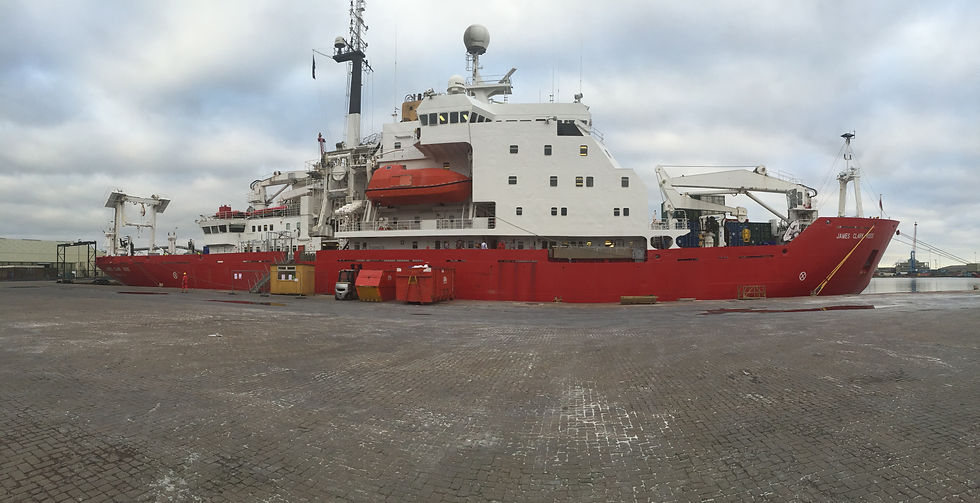
We were in dock in Immingham for 3 days setting up before we set sail, during which time we had to do safety drills and set up our work area. This involved using rope and bungee cord to strap everything down, including my precious microscope and amusingly even the water bath! Predictably it wasn't long before I realised I'd made an error in my packing. It wasn't a small error either. I'd brought 200 sample pots with me but had left their lids back in the lab at PML. I was horrified. After 2 hours of panic and a few frantic phone calls to the lab technician my lids were on the train with a scientist coming up to visit the ship for the day. I'd lucked out and thought I'd gotten away with it...
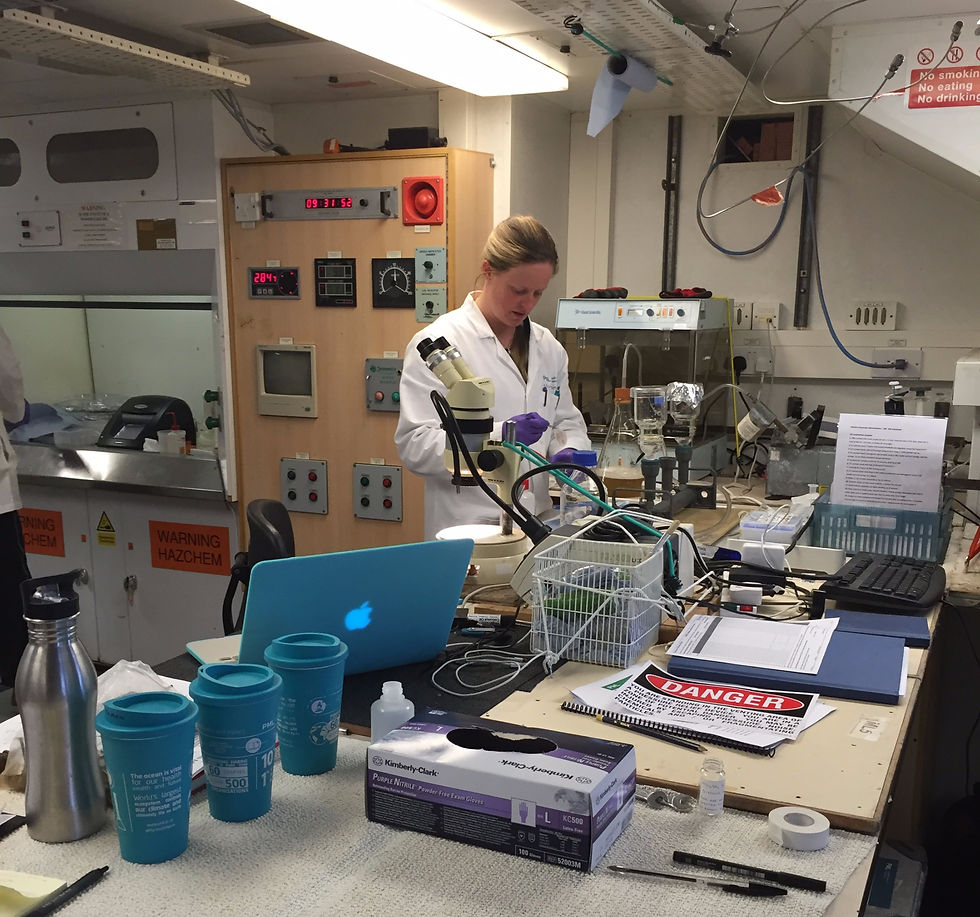
After fuelling at Portsmouth we set sail and headed directly south west into the middle of the Atlantic. The first few days were just a matter of people getting used to the motion of the ship (a fair bit of sea sickness), getting into a work routine, trouble shooting issues with equipment and getting into a personal routine onboard our new luxury ocean liner! I was sharing a cabin with another masters student called Kerri. Initially I was quite worried in case we didn't get on but it was quickly obvious we were going to get on like a house on fire and have some fun alongside the heavy workload.
We left the UK in late September and were effectively chasing the sun south the whole trip. It wasn't long before we were working on deck in only t shirts and along with the subtle change in the air and sea temperature each day my nets were pulling up different zooplankton every day. This is the single thing I enjoyed the most from the whole trip. I was the only biologist on board and bringing up live zooplankton every morning in my nets before dawn broke meant I had a few hours in a quiet lab where I could indulge in admiring the absolutely wondrous world of zooplankton under a microscope I'd taken with me.
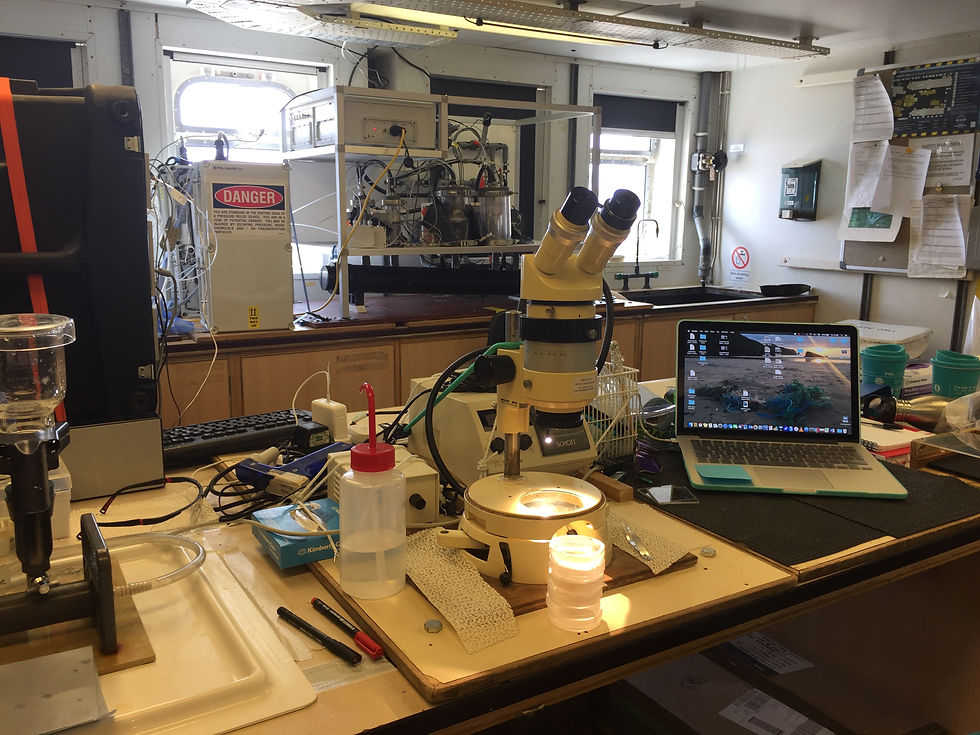
When I was a graduate straight out of university in Swansea I had a serious dislike for plankton. I didn't understand the fascination with something you couldn't see and found it an impossible task deciphering what you were looking at. I was even offered a PhD in the subject area but declined without a second thought. The irony of it now is quite amusing if not a bit frustrating as I embark on a PhD assessing waste water for plastic with a love of zooplankton I will have to put on hold for 4 years!
Slowly we all got into a routine and got to know the crew that outnumbered us scientists by 33 to 17. We had quiz nights, steak nights, gin and tonic nights and anything else anyone could dream up to entertain ourselves. I got into my own routine that worked pretty well for me and didn't change for the whole 7 weeks. I got up at 3.30am, got dressed and went down to the lab and checked the weather and sea conditions. Got dressed into the appropriate number of layers for the air temperature and went to the crew room to make a cup of tea to take on deck with me. I went out onto the aft deck and had a good look out to sea as the first glimpses of the sun were rising above the Atlantic horizon, then went to gather together my nets and buckets and took them up to the forward deck by the crane ready to be lifted over the side. By this time the deck crew joined me and we set everything up together and lifted the nets over the side and let the cable out so that the nets dropped into the ocean to a depth of 200m. We then had 20 minutes to wait (drink my cup of tea) before the nets had done their jobs and were back at the surface full of zooplankton and microplastic.

It was then the turn of the horizontal. This was logistically harder for the ship to deploy as we had to steam at 1 knot with the net over the side for 30 minutes. This meant that no other equipment could be in the water during this time so for this short period each day, just as the sun rose up over the horizon, the JCR was all mine. All 100m of icebreaker towing my two small nets across the ocean to fish for plastic. Everytime I look at these samples, even two years later, I think how lucky we are to have them; and how lucky I was to get them. Wire time on a cruise like this is hard to get. Once this tow was done it was time to wash the nets down, hang them up to dry and start filtering the cod end contents from their buckets through fine mesh to concentrate them down ready for microplastic extraction. The live zooplankton samples were left in their buckets in a dark area of the aft deck as that was my job for after breakfast.
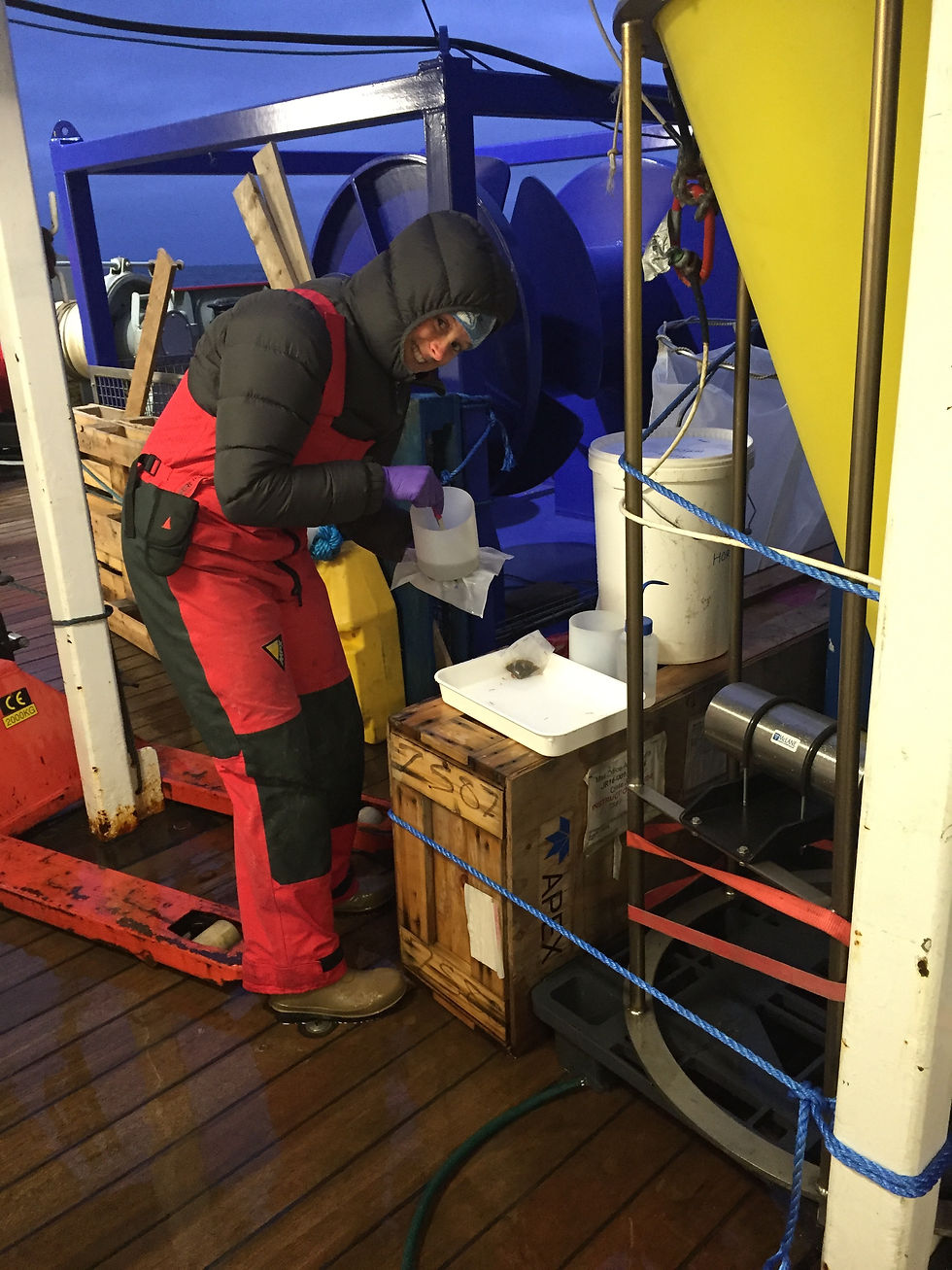
Once I had been refuelled with a substantial cooked breakfast it was back to the lab to pick out the zooplankton that I wanted to assess for microplastic ingestion and maintaining the constant conveyor belt of digestions from the previous days samples. This took me until lunch and usually past lunch. In the afternoon if I had time I went on the computer to do the social media thing for the cruise, send emails update my lab book and make sure all my spreadsheets were going to make sense once I got home. I usually finished around 4pm (a 13 hour day), went to the gym for a quick blast on the rowing machine, showered and went up to the bar for a well deserved gin and tonic. When the weather was nice the scientists slowly migrated out on the aft deck at this point, drink in hand, to take in the amazing sights of the open Atlantic Ocean. It was then time for dinner, after which I went up to the bridge to have a cup of tea and look at data from the ships instruments for the day; position and the echo sounder were the most amazing. Which city we were level with in Africa or South America and what depth the ocean got to - sometimes down to 9000m! My Navy friends back home couldn't get over our track - very few ships sail 100 degrees of latitude pretty much due south for 8000 miles intentionally! I enjoyed playfully rubbing my marine biology adventure into the Navy officers I knew back home who'd joined the Navy to "travel". At around 8pm I'd retire to my bunk, watch an episode of TV from my hard drive and then be in bed to sleep for 9pm ready to do it all again the next day.
As we headed south the air and sea temperature rose each day, the sea became clearer and clearer, flying fish started appearing on deck and the ocean turned to glass. It was at this point, about 3 weeks in, that the crews attention started turning to crossing the equator. Where polly wogs are brought in front of the court of Neptune and their charges read out and punished. Basically a day of entertainment, where the science is temporarily suspended so that the ships company can have some well deserved time off and fun... at the expense of those of us who had never crossed the equator via sea before. The preparations started about 4 days in advance when the kitchen collects it slops to create a revolting concoction to pour over our heads as each charge is read out in front of Neptune. Costumes are prepared, stories are gathered for the court hearing and banter is rife.
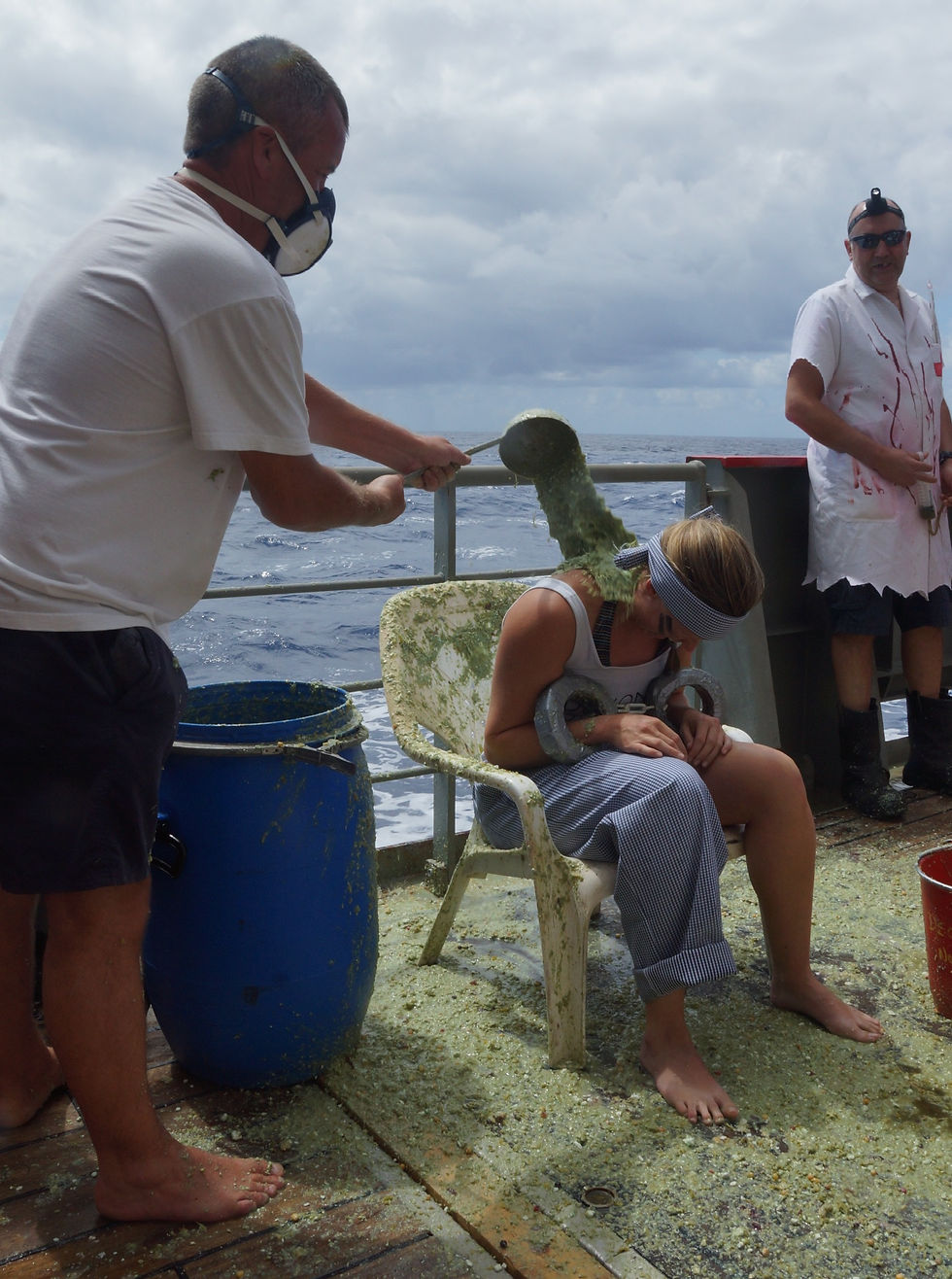
The idea is us polly wogs have to hide and try to avoid capture by the Shellbacks (those that have already crossed the line once or more). Once captured polly wogs are lined up ready for the hearing, with the bucket of slops ready for the punishment. However this bunch of polly wogs decided we weren't going down without a fight. We made our own slops, stored them in the ships hospital as the doctor was a fellow polly wog, and made water bombs out of the stinking liquid along with stolen flour from the galley made into flour bombs. We painted ourselves with war paint, dressed up in rags and made a tactical plan to attack the shellbacks as they tried to capture us. It all worked a treat. There was almighty fight on the aft deck with everyone laughing and screaming too much to really know what on earth was going on. No polly wogs had ever fought back so efficiently. Eventually we were all lined up infront of Neptunes court, our crimes read out and the punishment executed. This is where my lid incident back alongside in Immingham came back to bite me... I got extra slops for it, alongwith about 8 other stupid things I'd said or done in the 3 weeks I'd be onboard (predictably I had the most fines out of everyone!).

The aftermath of this ceremoney meant a good hour of fire hosing the decks and ourselves down. Then a trip to the barbours for those from the crew who were polly wogs as they are expected to shave their heads. Kerri and I cut off about 4 inches from our pony tails - the hair is still celotaped to my beautiful certificate from the ships captain. It was one of the most random and memorable days of my life, and I don't think I've ever laughed so much.
So back to the science... well things just carried on as they had done for the previous few weeks. Daily changes in the ocean flora and fauna reminded me that we were heading south by about 3-4 degrees a day. The ocean changed colour, the sky changed texture and as we headed south from the equator we headed into some really amazing patches of zooplankton. I had baby by-the-wind sailor jelly fish, bright blue copepods, weird sea spiders, amazing amhipods and fish larvae. As we headed into the rouring 40s we had some days where you struggled to stand because of the sea state. Equipment deployment was cancelled while we all battened down the hatches and stared out the windows at the raging sea outside. Even the non slip matting on the dinner table couldn't stop food sliding across the tables at times. The ocean turned a deep dark blue, wave crests and troughs started to be occupied by seabirds and squally rain clouds could be tracked across the horizon all around the ship. Until one day something magic appeared. Our first Albatross. Then another one, and another one, more species joined us heading south and they glided around the ship as if to welcome us into the far south of the Atlantic. Then the whales joined us... first sightings were just glimpses, then slowly they became more frequent and as more whales joined in they started to hang around the ship for longer. One morning Kerri and I were having our "smoko" (the Falklands name for elevenses) out on deck in a secluded part of the ship when I mentioned how awesome it would be to have our own whale fly past right there and then. Unbelievably as I spoke a humpback whale broke the surface of the water, swimming the opposite direction but as close as it could get to the side of the ship. It rolled onto its side, one fin out of the water and I swear it looked straight into our eyes before slipping back under the surface continuing its journey north. Kerri and I looked at each other in amazement and then broke into a fit of laughter. The South Atlantic was truly putting on a spectacular show for us.
It was at this time that the first murmurings of South Georgia started. We had made good time on our journey south, with no equipment breaking so our 2 days we had spare were still going spare. It has always been the objective of the Atlantic Meridional Cruise to head as far south as possible, however the logistics mean it rarely gets further south than just north of the Falklands before having to head into Port Stanley. This cruise turned out to be different. We were on a British Antarctic ship for starters, with a captain keen to visit the BAS station in South Georgia as the JCR hadn't been there for a year or so and the berth was free alongside the station. We were all told by the crew not to get excited as it's unlikely to happen due to the difficulties with fitting it into the schedule as we head further south into rough Southern Ocean and uncertain weather patterns.
So with all of our fingers crossed we crossed the Antarctic convergence zone where the Atlantic meets the southern ocean and headed into unplanned waters... hoping for adventure and some amazing science opportunities.
To be continued....
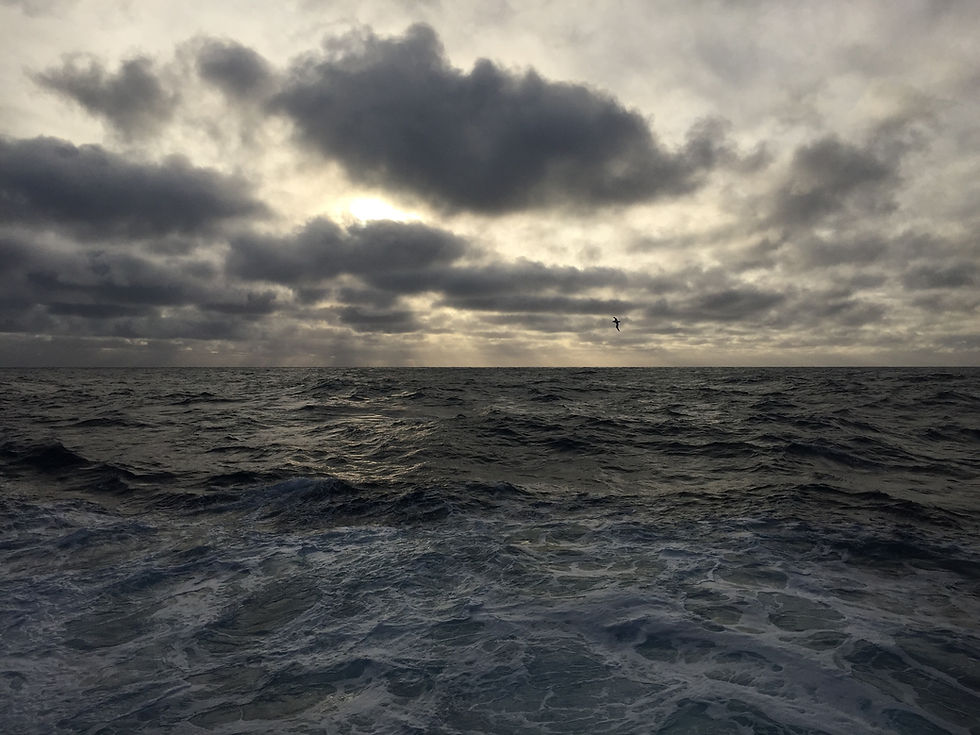

Comentarios